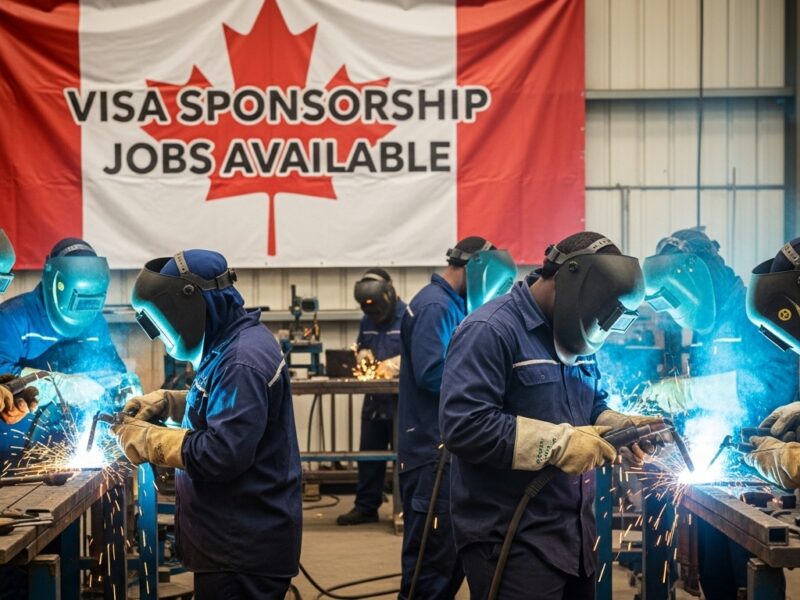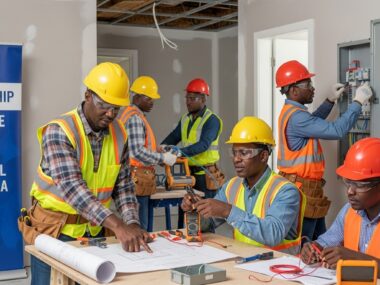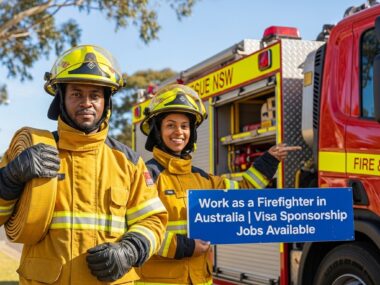Picture yourself crafting metal masterpieces in the heart of Canada’s booming industries, with the promise of a new life backed by visa sponsorship. Welding jobs in Canada for 2025 are calling skilled professionals from around the globe, offering not just a paycheck but a pathway to a stable, rewarding career in a country known for its high quality of life. With industries like construction, manufacturing, and oil and gas thriving, welders are in high demand, and many employers are eager to sponsor international talent. This guide dives into everything you need to know about welding jobs in Canada, from opportunities and requirements to visa sponsorship and the benefits of working in this vibrant nation.
Why Welding Jobs in Canada Are in High Demand
Canada’s economy is buzzing, and welders are at the heart of it. From towering skyscrapers to sprawling oil pipelines, skilled welders are essential for building and maintaining the nation’s infrastructure. The demand for welders is driven by several factors. First, Canada’s aging workforce means many experienced welders are retiring, creating a gap that needs filling. Second, major infrastructure projects, like bridges, highways, and energy facilities, are on the rise, especially in provinces like Alberta, Ontario, and British Columbia. Finally, industries such as automotive, shipbuilding, and aerospace rely heavily on welders to keep production lines moving.
The Canadian government recognizes this demand, listing welders (NOC 72106) as an in-demand trade under the National Occupational Classification. According to recent data, over 2,000 welding jobs with visa sponsorship are available across Canada, with projections estimating 17,700 job openings by 2030. This makes welding a stable career choice with excellent job security. For international workers, the added perk of visa sponsorship makes Canada an attractive destination to build a future.
Types of Welding Jobs Available in 2025
Welding is a versatile trade, and Canada offers a variety of roles to suit different skills and interests. Whether you’re a beginner or a seasoned pro, there’s a welding job for you. Here are some common types of welding jobs you can expect in 2025:
- Structural Welders: These welders work on construction sites, building frameworks for bridges, buildings, and other structures. They often use techniques like shielded metal arc welding (SMAW) or flux-cored arc welding (FCAW).
- Pipe Welders: Specializing in pipelines for oil, gas, or water, pipe welders are in high demand in Alberta’s energy sector. They typically use gas tungsten arc welding (GTAW) or TIG welding.
- Fabricator Welders: These professionals create custom metal products, such as gates, railings, or machinery parts, often in manufacturing settings.
- Maintenance Welders: Focused on repairing and maintaining equipment, these welders work in industries like mining, agriculture, and manufacturing.
- Aerospace Welders: For those with advanced skills, aerospace welding involves precision work on aircraft components, requiring certifications like D1.1.
Each role requires specific skills, but employers often provide training to help you specialize. For example, companies like Canada Construction Limited and SIN Structures Inc. are known for offering opportunities to develop expertise in advanced welding techniques.
Visa Sponsorship Opportunities for Welders
One of the biggest draws for international welders is the chance to secure visa sponsorship. Canada’s immigration system is designed to attract skilled tradespeople, and welders are a priority due to labor shortages. Here’s how visa sponsorship works and what you need to know:
Temporary Foreign Worker Program (TFWP)
The TFWP allows Canadian employers to hire foreign workers when there aren’t enough local candidates. To hire a welder, employers must obtain a Labour Market Impact Assessment (LMIA), proving that no Canadian worker is available for the job. Once approved, you can apply for a work permit, which typically lasts one to two years but can be extended. Many welding jobs, especially in industrial hubs like Labrador City or St. John’s, offer TFWP sponsorship.
Express Entry and Federal Skilled Trades Program (FSTP)
The FSTP, part of the Express Entry system, is a fantastic option for welders seeking permanent residency. You don’t need a job offer to apply, but having one boosts your chances. The program evaluates you based on factors like age, education, work experience, and language skills (English or French). Welders with certifications like Red Seal or Canadian Welding Bureau (CWB) credentials score higher points, making it easier to secure permanent residency.
Provincial Nominee Program (PNP)
Each province in Canada has its own PNP, targeting skilled trades to fill local labour gaps. For example, the Saskatchewan Immigrant Nominee Program and Atlantic Immigration Program prioritize welders for roles in manufacturing and construction. If nominated by a province, you can apply for permanent residency through the federal government. PNPs are especially popular in regions like Newfoundland and Labrador, where companies like DF Booking Recruitment Services are hiring welders with sponsorship.
Eligibility Requirements
To qualify for visa sponsorship, you typically need:
- A high school diploma or equivalent.
- Vocational training or a welding certificate (e.g., CWB, AWS, or Red Seal).
- 1-5 years of welding experience, depending on the role.
- Proficiency in English or French (proven through tests like IELTS or TEF).
- A clean criminal record and, in some cases, a medical exam.
Some employers, like HyLife in Manitoba, may even assist with language training or provide relocation support to help you settle in Canada.
Salary and Benefits for Welders in Canada
Welding jobs in Canada are not just about the work—they come with competitive pay and attractive benefits. On average, welders earn between $49,000 and $74,000 per year, with hourly wages ranging from $25 to $40, depending on experience and location. Specialized roles, like pipe welders in Alberta’s oil sector, can earn up to $100,000 annually with overtime.
Beyond salary, employers often offer:
- Health and Dental Insurance: Comprehensive plans to cover medical and dental care.
- Retirement Plans: Contributions to pension or RRSP plans for long-term financial security.
- Overtime Pay: Many welding jobs, especially in construction, offer generous overtime rates.
- Relocation Assistance: Some companies provide housing support or travel expense coverage.
- Training Programs: Opportunities to gain certifications or learn new welding techniques.
For example, companies like Southwestern Manufacturing Inc. and Propak Systems Ltd. emphasize career growth, offering training and mentorship to help welders advance to supervisory roles or specialize in high-demand areas like TIG welding.
Key Skills and Certifications for Welding Jobs
To stand out in Canada’s welding job market, you’ll need a mix of technical skills and certifications. Employers value welders who can handle various welding techniques and work safely in fast-paced environments. Here are the key skills and certifications to focus on:
Essential Skills
- Welding Techniques: Proficiency in MIG, TIG, SMAW, FCAW, or GTAW is a must. Knowledge of multiple techniques increases your employability.
- Blueprint Reading: The ability to interpret technical drawings and specifications is critical for structural and pipe welding.
- Equipment Operation: Familiarity with welding machines, plasma cutters, and hoisting equipment.
- Safety Awareness: Canada has strict workplace safety regulations, so understanding safety protocols is essential.
- Physical Stamina: Welding often involves heavy lifting, standing for long periods, and working in challenging environments.
Certifications to Boost Your Resume
- Red Seal Certification: Recognized across Canada, this credential proves your expertise and is highly valued by employers.
- Canadian Welding Bureau (CWB) Certification: Required for many structural welding jobs, especially in construction.
- American Welding Society (AWS) Certification: Useful for international welders, as it’s recognized globally.
- Specialized Tickets: Certifications like gasfitter “B” or D1.1 for aerospace welding can open doors to niche roles.
If you don’t have these certifications, don’t worry—many employers offer training or support to help you obtain them. For instance, Ideal Welders Ltd. provides on-the-job training for apprentices and newcomers.
Where to Find Welding Jobs with Visa Sponsorship
Finding welding jobs with visa sponsorship is easier than you might think, thanks to Canada’s robust job market and online resources. Here are some top places to start your search:
- Job Portals: Websites like Indeed, Glassdoor, and Job Bank list thousands of welding jobs, many with visa sponsorship. For example, Indeed currently lists over 2,200 welding jobs with sponsorship across Canada.
- Company Websites: Major employers like Canada Construction Limited, SIN Structures Inc., and HyLife post openings directly on their sites.
- Recruitment Agencies: Agencies like DF Booking Recruitment Services specialize in placing international welders in Canadian jobs, handling visa paperwork for you.
- Networking: Connect with industry professionals on platforms like LinkedIn or attend job fairs in Canada to learn about opportunities.
When applying, tailor your resume to highlight your welding experience, certifications, and language skills—“Canadian resume for welder jobs” is a great keyword to search for templates. Always check job listings for phrases like “visa sponsorship available” to ensure eligibility.
Look out for Truck Driving Jobs In Canada with Visa Sponsorship
Top Provinces for Welding Jobs in 2025
Canada’s provinces offer unique opportunities for welders, with some regions standing out for their high demand and sponsorship programs. Here are the top provinces to consider:
- Alberta: Known for its oil and gas industry, Alberta offers high-paying pipe welding jobs. Cities like Calgary and Edmonton are hotspots for welders.
- Ontario: With a strong manufacturing sector, Ontario has opportunities in automotive and aerospace welding, especially in Toronto and Windsor.
- British Columbia: Construction and shipbuilding drive demand in Vancouver and Victoria, with many employers offering relocation support.
- Newfoundland and Labrador: Labrador City and St. John’s are booming with industrial projects, offering 20+ vacancies through companies like DF Booking.
- Saskatchewan: The province’s PNP targets welders for roles in agriculture and manufacturing, with competitive wages.
Each province has its own PNP, so research which one aligns with your skills and goals. For example, the Atlantic Immigration Program is ideal for welders targeting Atlantic Canada.
Challenges and How to Overcome Them
While welding jobs in Canada are rewarding, international applicants may face challenges. Here’s how to tackle them:
- Visa Processing Delays: Immigration processes can be slow. Work with a reputable agency or immigration lawyer to streamline your application.
- Language Barriers: If English or French isn’t your first language, take language courses or tests like IELTS early to prove proficiency.
- Credential Recognition: Foreign certifications may need validation. Apply for a skills assessment through programs like Red Seal to ensure your qualifications are recognized.
- Cultural Adjustment: Moving to a new country can be daunting. Join expat communities or connect with local welders to ease the transition.
Companies like Mikes Mobile Welding and Petro-Line Construction Ltd. often provide support, such as accommodation or mentorship, to help newcomers settle in.
Why Choose Canada for Your Welding Career?
Canada isn’t just a place to work—it’s a place to thrive. The country’s high standard of living, excellent healthcare, and multicultural society make it a top destination for skilled workers. Welders enjoy:
- Work-Life Balance: Canadian labour laws ensure fair hours and paid vacation time.
- Cultural Diversity: Canada welcomes immigrants, making it easy to feel at home.
- Pathway to Permanent Residency: Visa sponsorship jobs often lead to permanent residency, allowing you to build a long-term future.
- Safe Work Environment: Strict safety regulations protect welders on the job.
Plus, with an average welder’s age of 55, Canada is eager to bring in young, skilled talent to replace retiring workers, ensuring long-term job stability.
Tips for Landing a Welding Job with Visa Sponsorship
Ready to start your journey? Here are some practical tips to secure a welding job in Canada:
- Update Your Resume: Highlight your welding experience, certifications, and any specialized skills like TIG or MIG welding.
- Get Certified: Obtain Red Seal or CWB certification to boost your credibility.
- Learn the Language: Improve your English or French skills to meet job and visa requirements.
- Apply Early: Many jobs for 2025 are already being posted, so don’t wait to submit applications.
- Work with Experts: Partner with recruitment agencies or immigration consultants to navigate the visa process.
Final Thoughts
Welding jobs in Canada for 2025 offer more than just a career—they’re a gateway to a new life in a welcoming, opportunity-rich country. With visa sponsorship, competitive salaries, and a high demand for skilled welders, now’s the perfect time to make your move. Whether you’re drawn to Alberta’s oil fields, Ontario’s manufacturing hubs, or Newfoundland’s industrial projects, there’s a welding job waiting for you. Start preparing your resume, brush up on your skills, and take the first step toward a rewarding future in Canada.
Helpful Resources
- Indeed Canada – Search for welding jobs with visa sponsorship.
- Job Bank Canada – Browse thousands of welder job postings.
- Canada Immigration Services – Learn more about visa options for welders.






